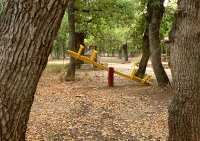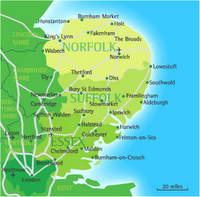
Thursday, September 07, 2006
The Daily Hump: Teeter-Totter
 In yesterday's hump I referenced the East Anglian word murgeon, meaning manure. East Anglia is the focus of today's hump, too, inspired by a piece in this week's Economist entitled "Dew you go down to Norfolk." The short piece reports on the recent push by local officials to reinforce the Norfolk dialect in elementary schools around the region. To give you an idea of what we're dealing with bishy-barney-bee translates as ladybird (Bishy-Barney-Bee Johnson?). And a tittermatorter is a seesaw.
In yesterday's hump I referenced the East Anglian word murgeon, meaning manure. East Anglia is the focus of today's hump, too, inspired by a piece in this week's Economist entitled "Dew you go down to Norfolk." The short piece reports on the recent push by local officials to reinforce the Norfolk dialect in elementary schools around the region. To give you an idea of what we're dealing with bishy-barney-bee translates as ladybird (Bishy-Barney-Bee Johnson?). And a tittermatorter is a seesaw. In the article, the Norfolkian linguist Peter Trudgill states that the American teeter-totter is a direct decendant of tittermatorter. I wasn't willing to take this statement at face value and decided to investigate. In English (American or otherwise) both teeter and totter have etymologies that are independent of East Anglian dialect. Teeter is a variation of titter (which the OED somewhat unhelpfully defines as "totter"). Titter has a Teutonic etymology while totter first appears around 1200 and is believed to have Norse roots. While it's possible that the Anglos who settled the Norfolk area brought with them the Teutonic/Norse hybrid tittermatorter, which then morphed into the American teeter-totter, it seems more likely that teeter-totter developed independent of tittermatorter from common etymological roots. Afterall, both teeter-totter and tittermatorter are prime examples of a very common linguistic process called reduplication, where a word or syllable is doubled, often with a different vowel. As the American Heritage Dictionary notes, "reduplication is typical of words that indicate repeated activity, such as riding up and down on a seesaw." There is nothing in the etymological history of either teeter or totter that suggests an East Anglian influence.
In the article, the Norfolkian linguist Peter Trudgill states that the American teeter-totter is a direct decendant of tittermatorter. I wasn't willing to take this statement at face value and decided to investigate. In English (American or otherwise) both teeter and totter have etymologies that are independent of East Anglian dialect. Teeter is a variation of titter (which the OED somewhat unhelpfully defines as "totter"). Titter has a Teutonic etymology while totter first appears around 1200 and is believed to have Norse roots. While it's possible that the Anglos who settled the Norfolk area brought with them the Teutonic/Norse hybrid tittermatorter, which then morphed into the American teeter-totter, it seems more likely that teeter-totter developed independent of tittermatorter from common etymological roots. Afterall, both teeter-totter and tittermatorter are prime examples of a very common linguistic process called reduplication, where a word or syllable is doubled, often with a different vowel. As the American Heritage Dictionary notes, "reduplication is typical of words that indicate repeated activity, such as riding up and down on a seesaw." There is nothing in the etymological history of either teeter or totter that suggests an East Anglian influence.(For more on reduplication, see my Macaca post.)
Teeter [OED]
Totter [OED]
Titter [OED]
Titter-Totter [OED]
Teeter-Totter [OED]
Labels: East Anglian, The Daily Hump
:: posted by David, 8:47 AM